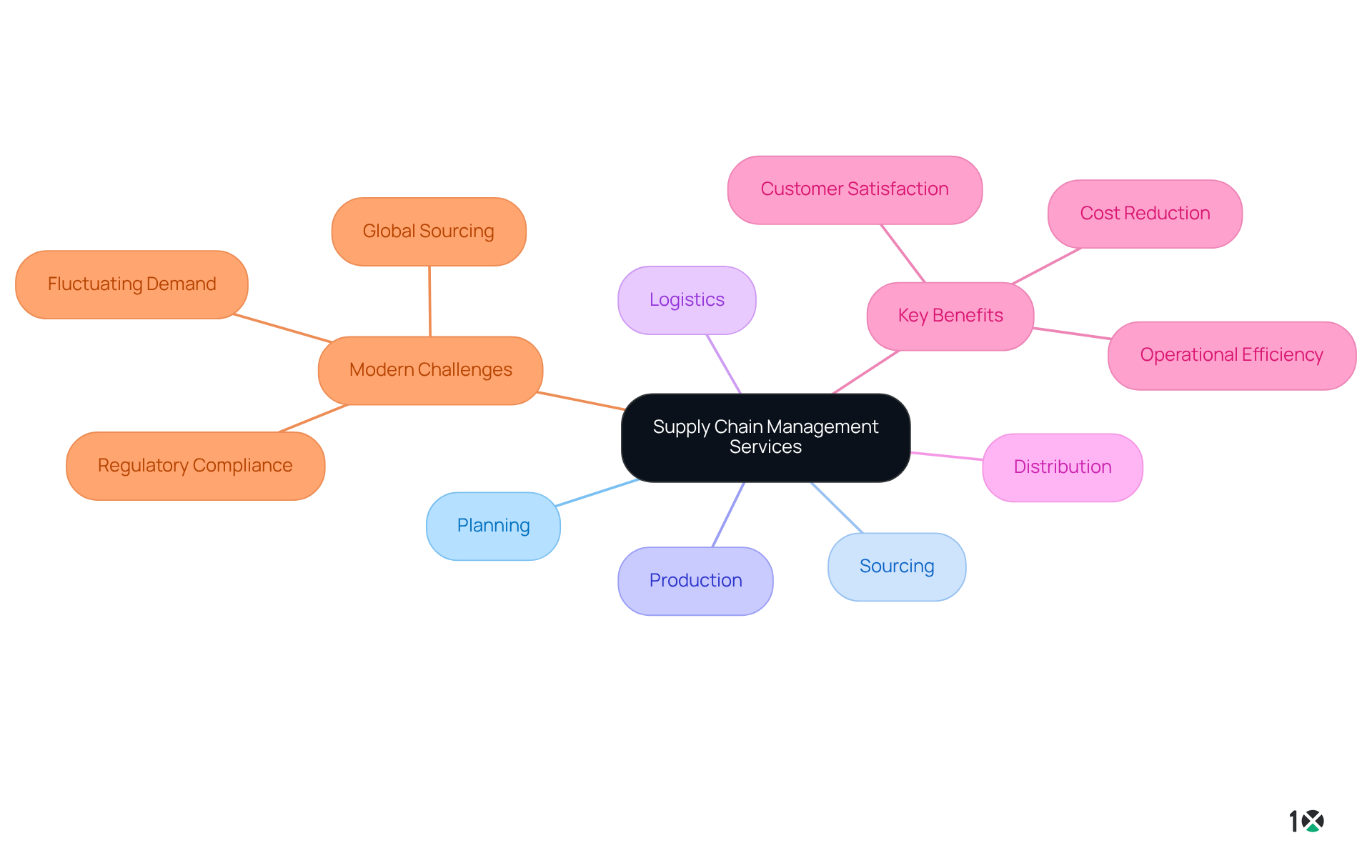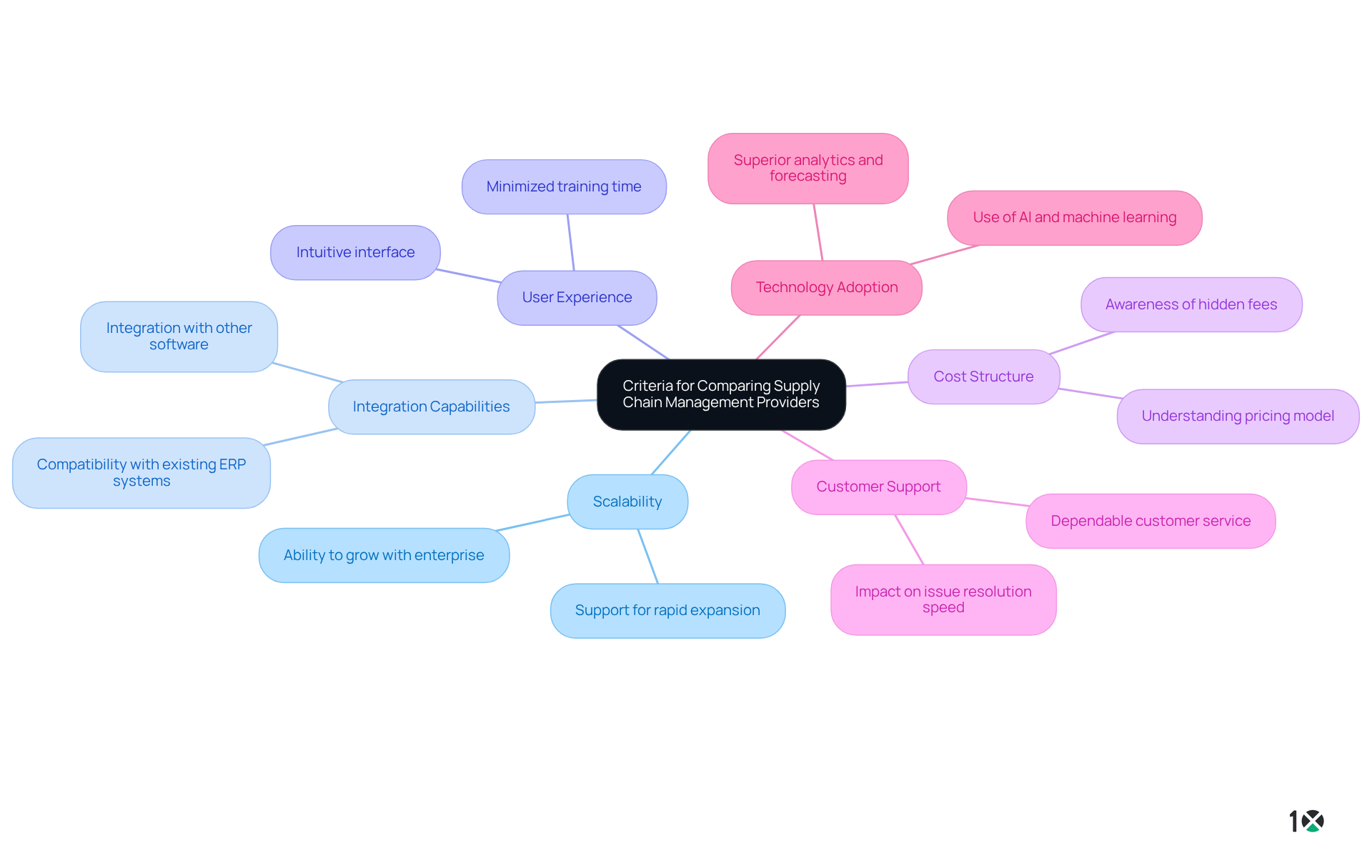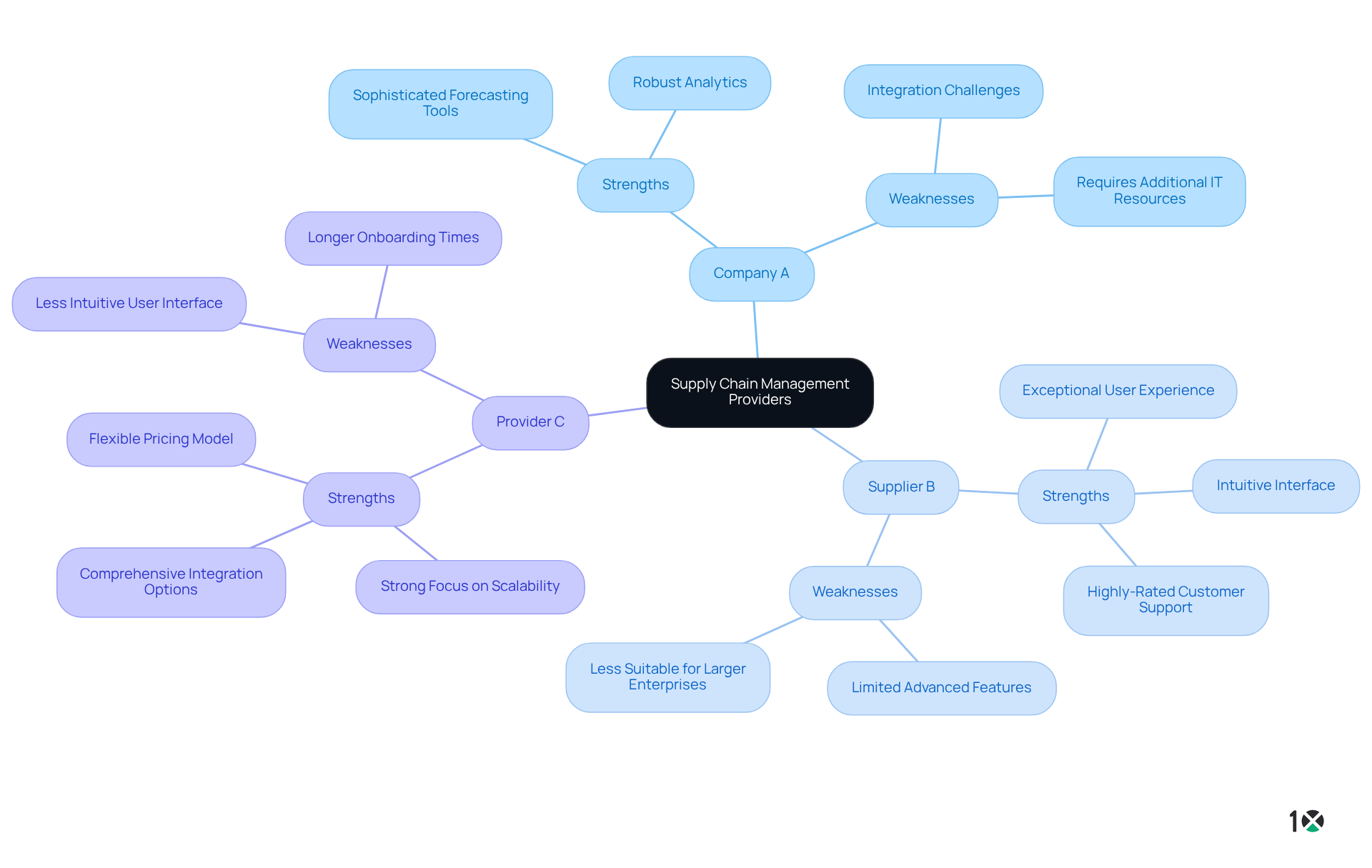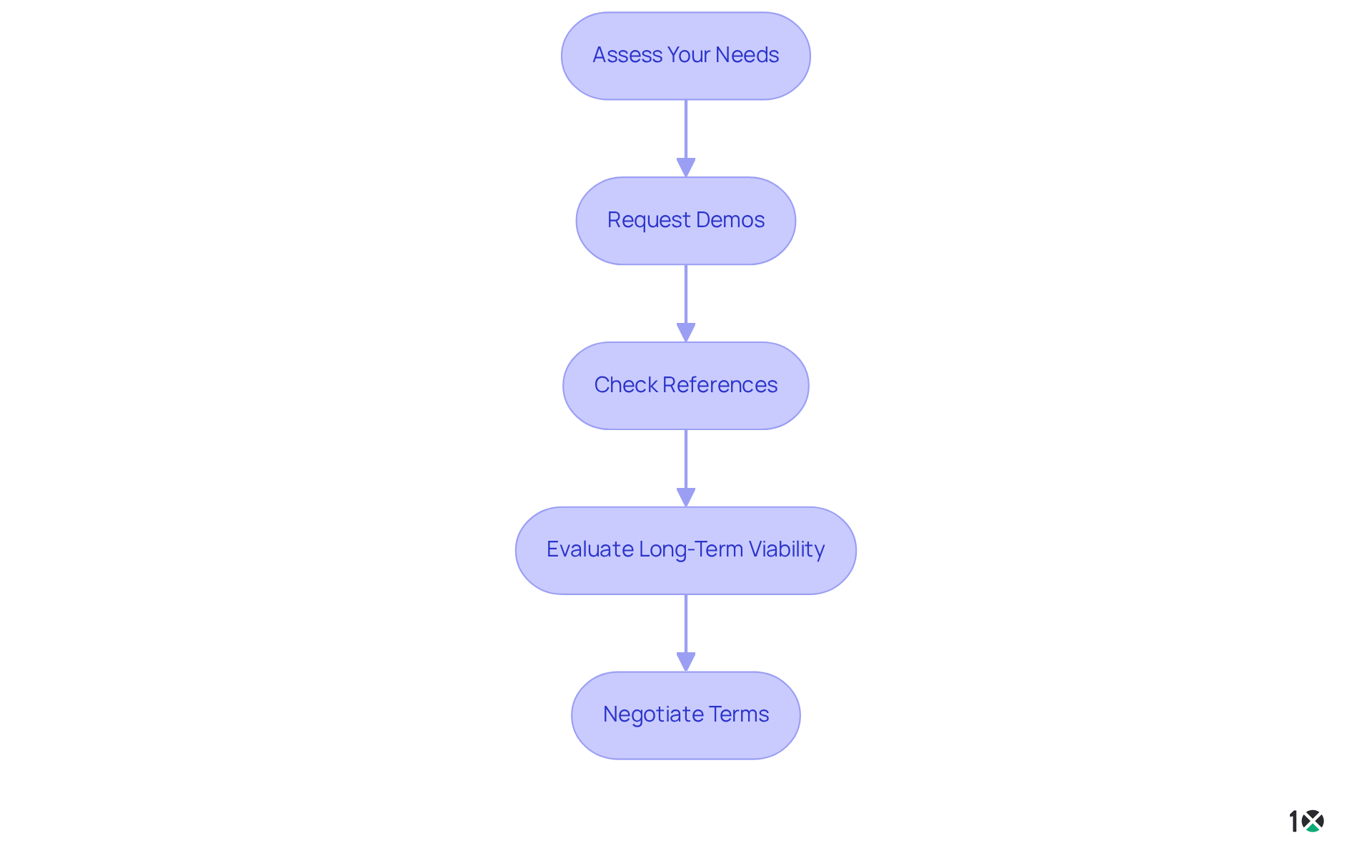Overview
This article presents a comprehensive comparative analysis of supply chain management (SCM) services, providing insights on how to effectively evaluate and select the most suitable providers based on a range of criteria. It underscores critical factors such as:
- Scalability
- Integration capabilities
- User experience
- Technology adoption
These elements are essential for organizations aiming to make informed decisions that align with their operational needs and strategic objectives.
Introduction
Supply chain management services are crucial for ensuring the seamless flow of goods and services. However, many organizations encounter difficulties in navigating the complexities of selecting the right provider. As reliance on advanced technologies grows and the demand for operational efficiency becomes increasingly pressing, understanding the nuances of various supply chain management options is more critical than ever.
How can businesses ensure they choose a provider that not only addresses their current needs but also adapts to future challenges? This comparative analysis examines the strengths and weaknesses of leading supply chain management providers, offering insights that empower decision-makers to make informed choices in a rapidly evolving landscape.
Understanding Supply Chain Management Services
Supply chain management services encompass a range of processes essential for the effective movement of goods and services from suppliers to end users. These services include critical components such as:
- Planning
- Sourcing
- Production
- Logistics
- Distribution
Effective SCM is not merely beneficial; it is crucial for optimizing operational efficiency, reducing costs, and enhancing customer satisfaction. In today’s fast-paced market, companies increasingly rely on supply chain management services to address challenges such as fluctuating demand, global sourcing, and regulatory compliance.
As organizations adopt cloud-based solutions, the integration of SCM with ERP systems has emerged as a vital necessity. This integration facilitates real-time data visibility, significantly improving decision-making capabilities. By leveraging these technologies, companies can not only streamline their supply chain processes but also position themselves to respond swiftly to market changes. Ultimately, embracing advanced supply chain management services is imperative for any company that aims to maintain a competitive edge in a rapidly evolving landscape.

Criteria for Comparing Supply Chain Management Providers
When evaluating supply chain management providers, several key criteria must be taken into account:
- Scalability: The provider’s ability to grow alongside your enterprise is crucial, especially for distributors experiencing rapid expansion.
- Integration Capabilities: Effective supply chain management services require integration capabilities with existing ERP systems and other software to sustain operational efficiency.
- User Experience: An intuitive interface can greatly boost productivity and minimize training time for employees.
- Cost Structure: Grasping the pricing model, including any hidden fees, is essential for accurate budgeting and financial planning.
- Customer Support: Dependable customer service can significantly impact the speed of issue resolution and the maintenance of smooth operations.
- Technology Adoption: Providers that utilize cutting-edge technologies like AI and machine learning can deliver superior analytics and forecasting capabilities.

Comparative Analysis of Leading Supply Chain Management Providers
In this comparative analysis, we delve into three leading supply chain management providers that stand out in the industry:
-
Company A, esteemed for its robust analytics capabilities, offers sophisticated forecasting tools through its supply chain management services, empowering businesses to anticipate demand fluctuations. Despite its strengths, integration with existing systems can pose challenges, necessitating additional IT resources to ensure seamless operation.
-
Supplier B is distinguished by its exceptional user experience, which is supported by its supply chain management services, featuring an intuitive interface that simplifies navigation. Its highly-rated customer support enhances its appeal; however, it may fall short on some advanced features offered by competitors, which could limit its suitability for larger enterprises.
-
Provider C, with a strong focus on scalability, is ideally suited for expanding enterprises that require effective supply chain management services. It provides comprehensive integration options and a flexible pricing model, catering to diverse business needs. Nonetheless, its user interface is less intuitive, potentially resulting in longer onboarding times for new users.
In summary, each provider presents unique advantages and challenges. Evaluating these factors will enable Operations Managers to make informed decisions tailored to their specific requirements.

Recommendations for Selecting the Right Supply Chain Management Provider
When selecting the right supply chain management provider, it is essential to focus on specific recommendations that can guide your decision-making process:
- Assess Your Needs: Start by clearly defining your business goals and operational challenges. This will enable you to identify the features that are most important to you in supply chain management services, ensuring alignment with your strategic objectives.
- Request Demos: Engage with prospective vendors to observe their solutions in action. Interacting with their offerings allows you to evaluate user experience and functionality, which is critical for informed decision-making.
- Check References: Reach out to current users to gain insights into their experiences, particularly regarding customer support and system performance. This feedback can provide valuable perspective on the provider’s reliability.
- Evaluate Long-Term Viability: It is crucial to consider the provider’s track record and commitment to innovation. Ensure that they possess the adaptability required to navigate future market changes effectively.
- Negotiate Terms: Finally, do not hesitate to discuss pricing and contract terms. Ensuring these align with your budget and expectations is vital for a successful partnership.

Conclusion
Supply chain management services are essential for ensuring the seamless flow of goods and services from suppliers to end users. This comparative analysis underscores the critical importance of selecting the right provider, as effective SCM is not merely a competitive advantage but a necessity in today’s dynamic market environment. Companies must prioritize integration, scalability, and user experience to optimize their operations and enhance customer satisfaction.
The article delves into key criteria for evaluating supply chain management providers, emphasizing the need to assess:
- Scalability
- Integration capabilities
- User experience
- Cost structure
- Customer support
- Technology adoption
It also presents a comparative look at three leading providers, each with distinct strengths and challenges, enabling Operations Managers to make informed choices tailored to their specific needs.
Ultimately, the selection of a supply chain management provider can significantly impact a company’s operational efficiency and market responsiveness. By adhering to the outlined recommendations—such as:
- Assessing business needs
- Requesting demos
- Checking references
- Evaluating long-term viability
- Negotiating terms
organizations can ensure they partner with a provider that aligns with their strategic goals. Embracing advanced supply chain management services is crucial for maintaining competitiveness and navigating the complexities of modern commerce.
Frequently Asked Questions
What are supply chain management services?
Supply chain management services encompass a range of processes essential for the effective movement of goods and services from suppliers to end users, including planning, sourcing, production, logistics, and distribution.
Why is effective supply chain management important?
Effective supply chain management is crucial for optimizing operational efficiency, reducing costs, and enhancing customer satisfaction.
What challenges do companies face that supply chain management services can address?
Companies face challenges such as fluctuating demand, global sourcing, and regulatory compliance that supply chain management services help to address.
How does cloud-based technology influence supply chain management?
Cloud-based solutions facilitate the integration of supply chain management with ERP systems, enabling real-time data visibility and improving decision-making capabilities.
What benefits do companies gain from integrating supply chain management with ERP systems?
Companies can streamline their supply chain processes, respond swiftly to market changes, and improve overall operational efficiency by integrating supply chain management with ERP systems.
Why is embracing advanced supply chain management services essential for companies?
Embracing advanced supply chain management services is imperative for companies aiming to maintain a competitive edge in a rapidly evolving market landscape.
